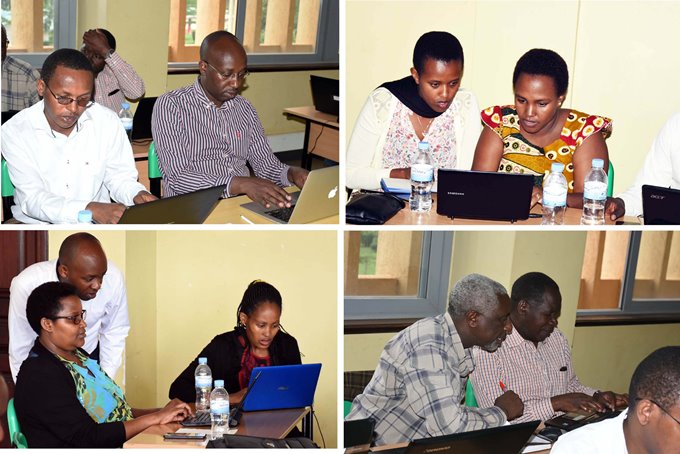In the pursuit for quality research, a training for the University of Rwanda PhD students and supervisors and lecturers was organized around the use of Turnitin. This is an online test matching tool that enables researchers and academics to control their manuscripts and improve the quality of their papers which will broadly be impactful for the quality of research.
The training was initiated following a research paper about plagiarism in Rwanda which put the quality of some of the produced papers in the country under scrutiny. Some of cases identified were subject to the lack of correct references or not giving credit to the original authors.
“I collected a number of defended and submitted thesis from the University database with a view to check their originality and the results showed some elements of plagiarism,” said Jean Claude Byungura, a PhD student at Stockholm University who facilitated the training.
Mr Byungura & UR academics during the training
According to Byungura who doubles as a lecturer at the College of Business and Economics, the training about Turnitin will help the University to improve the quality of research from both students and lecturers.
The tool was championed by the Centre for Distance and e-learning based at the College of Education under the support of UR-Sweden Programme. The training brought together newly recruited PhD students from the African Centre of Excellence in Data Science, PhD supervisors and lecturers at the College of Business and Economics.
Speaking during the training, Jean Bosco Ndikubwimana, a PhD student in Data Science, specializing in econometrics and also a lecturer at the College of Business and Economics noted that the training will enable him to control the originality of his publications and papers.
Ndikubwimana (L) and his Colleague during the training
“I have realized that in our current publications, we were making some errors that can be easily controlled by the software” He said, adding that the training will also enhance their skills with regard to referencing which is still an issue to many local researchers.
Ndikubwimana went on branding Turnitin not only as a tool to enable him and his colleagues to produce good and genuine papers that doesn’t give room to similarities but also to help the University ranking to improve. He also called on Rwanda Higher Education Council to have an upper hand in the use of Turnitin in all academic levels especially in all higher learning and research institutions.
Turnitin is an online test matching tool that enables researchers and academics to control their writing and improve the quality of their papers before they can send them to journals, conference presentation and even to supervisors. It is also a computer based tool whereby one uploads the manuscript to be checked against a million of database online for text similarities

Participants in the training
As an Internet-based plagiarism detection service, Turnitin was launched in 1997. Universities and higher learning schools typically buy licenses to use the software-as-a-service website, which checks submitted documents against its database and the content of other websites with the aim of identifying plagiarism. Results can identify similarities with existing sources, and can also be used in formative assessment to help students learn to avoid plagiarism and improve their writing.
For full access to all the event photos : Click here
By Darius Murangwa
Communications Officer